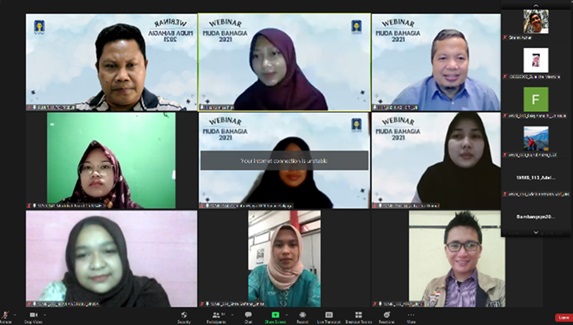Mengelola Hidup Bahagia bagi Mahasiswa Managing Happy Life for Students
Main Article Content
Abstract
Today, many young people are less able to manage their lives to are unhappy, such as insomnia, anxiety, stress, depression, addiction to drugs or alcohol, and problematic emotional relationships. This problem is becoming more severe due to the widespread use of social media. Although social media provides easy and inexpensive communication facilities, it also creates vulnerability for young people due to the flood of communications and hoaxes. This situation is unfavorable for young people, so it needs "treatment." The goal is that students can manage their lives to become happy and have a bright future. The method used is lectures and online discussions. The meeting was held for eight meetings. Through a series of webinars in eight meetings, the activities greatly benefited students. Through these activities, students can learn how to manage their lives and also social media for their lives.
Downloads
Article Details

This work is licensed under a Creative Commons Attribution-ShareAlike 4.0 International License.
Authors who publish with this journal agree to the following terms:
- Any article on the copyright is retained by the author(s).
- Author grant the journal, right of first publication with the work simultaneously licensed under a Creative Commons Attribution License that allows others to share work with acknowledgment of the work authors and initial publications in this journal.
- Authors are able to enter into a separate, additional contractual arrangements for non-exclusive distribution of published articles of work (eg, post-institutional repository) or publish it in a book, with acknowledgment of its initial publication in this journal.
- Authors are permitted and encouraged to post their work online (e.g., in institutional repositories or on their websites) prior to and during the submission process, as can lead to productive exchanges, as well as earlier and greater citation of published work.
- The article and any associated published material is distributed under the Creative Commons Attribution-ShareAlike 4.0 International License
References
Ahmad, N. A., Widianti, E., & Somantri, I. (2021). Gambaran kebahagiaan pada mahasiswa keperawatan. Jurnal Keperawatan Jiwa (JKJ): Persatuan Perawat Nasional Indonesia, 9(11), 11–26. https://jurnal.unimus.ac.id/index.php/JKJ/article/view/6180/pdf
Argyle, M. (2001). The psychology of happiness. In Routledge (2nd ed.). Routledge.
Dharmastuti, A., Apriliyanti, F., & Wahyuni, F. (2021). Exploring the impact of COVID-19 hoax on the mental health of millennial moms. KnE Social Sciences. https://doi.org/10.18502/kss.v4i15.8230
Halimbash, N., Rifayanti, R., & Putri, E. T. (2021). Kebahagiaan dan komunikasi interpersonal terhadap kecenderungan ketakutan akan kehilangan momen. Psikoborneo: Jurnal Ilmiah Psikologi, 9(2), 381. https://doi.org/10.30872/psikoborneo.v9i2.5979
Liu, J. (2017). Causes and solutions to the psychological problems of the 90s college students. Proceedings of the 2016 2nd International Conference on Economics, Management Engineering and Education Technology (ICEMEET 2016). https://doi.org/10.2991/icemeet-16.2017.178
Nabila, A., Putri, N. A., Nafisah, S., & Nashori, F. (2021). Sincerity and happiness of students in Yogyakarta: Keikhlasan dan kebahagiaan mahasiswa di Yogyakarta. Proceding of Inter-Islamic University Conference on Psychology, 1(1). https://press.umsida.ac.id/index.php/iiucp/article/view/600/433
Rustiani, A. (2021). Data riset: Kesehatan mental mahasiswa saat pandemi & kuliah online. Tirto.Id. https://tirto.id/data-riset-kesehatan-mental-mahasiswa-saat-pandemi-kuliah-online-gaEc
Sofia, N., & Sari, E. P. (2018). Indikator kebahagiaan (Al-Sa’adah) dalam perspektif Alquran dan hadis. Psikologika: Jurnal Pemikiran dan Penelitian Psikologi, 23(2), 91–108. https://doi.org/10.20885/psikologika.vol23.iss2.art2
Undiyaundeye, F. (2014). Impact of social media on children, adolescents and families. G.J.I.S.S, 3(2), 1–4. https://www.longdom.org/articles/impact-of-social-media-on-children-adolescents-and-families.pdf
Weij, P. A. Van Der. (2017). Filsuf-filsuf besar tentang manusia. In Terjemahan oleh K. Bertens (Ed.), Gramedia.
